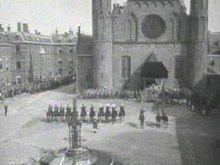Prinsjesdag
Prinsjesdag ( German Prinzentag ) is an important day in Dutch politics , on which the parliamentary session year opens. It takes place every year on the third Tuesday in September. On Prinsjesdag the Dutch head of state , currently King Willem-Alexander , reads the speech from the throne . In it the government announces the objectives of its policy for the coming year.
Pursuant to Article 65 of the Dutch Constitution , “on every third Tuesday in September (...) a declaration is made by the King or on his behalf in a plenary assembly of the States General on the policy to be pursued by the government." According to Article 105, paragraph 2 of the Constitution the event coincides with the submission of the budget for the coming year.
This is followed by the so-called “general considerations” (general debate ) in the Second Chamber of the States General , the lower house of the Parliament of the Netherlands, in the context of which the Rijksbegroting , the imperial budget , also called miljoenennota , is debated.
Prinsjesdag is associated with a lot of ritual . The king takes the glass coach - the traditionally used golden coach is currently being restored - from the Paleis Noordeinde to the great hall in The Hague , and the finance minister carries a suitcase with the inscription “Third Tuesday in September”. Inside is the miljoenennota . Their contents are officially kept secret until Prinsjesdag, although details are often leaked in advance.
history
In the 18th century, Prinsjesdag was one of the most popular holidays in the country, on which the birthday of the governor Prince Wilhelm V of Orange was originally celebrated on March 8th. This is where the name Prinsjesdag comes from . Between 1780 and 1797 - known as the Patriotic Era - this was the day the people showed signs of loyalty to the Orange . Possibly for this reason, but not until around 1930, the name Prinsjesdag was also used for the ceremonial opening of parliament.
The constitution has always determined on which day of the year the opening of parliament falls. In the first half of the 19th century , the first Monday in November and then the third Monday in October were originally intended for this. After an annual budget was introduced in 1848, more time was needed for budget debates, and the opening of Parliament was brought forward by one month to September. However, since Monday turned out to be an unfavorable day because many parliamentarians from remote parts of the country did not want to travel to The Hague on a Sunday because of the Sunday rest, a constitutional amendment in 1887 replaced Monday with Tuesday.


